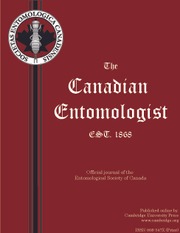No CrossRef data available.
Article contents
Psylla pyricola Foerster Suppresses Pear Tree Root Development1
Published online by Cambridge University Press: 31 May 2012
Abstract
Foliage feeding by the pear psylla suppressed root development in seedlings of Pyrus communis, P. ussuriensis, and P. pyrifolia. Reduction in the size of the root system was greatest in seedlings with the heaviest infestations. Psyllid populations were established more readily on seedlings of P. communis than on the oriental seedlings of P. ussuriensis or P. pyrifolia.
- Type
- Articles
- Information
- Copyright
- Copyright © Entomological Society of Canada 1964
References
Carter, W. 1939. Injuries to plants caused by insect toxins. Bot. Rev. 5: 273–326.CrossRefGoogle Scholar
Hartman, H. 1961. Pear decline — a progress report. Proc. Oregon St. Hort. Ass. 53: 41–52.Google Scholar
Lindner, R. C., Burts, E. C. and Benson, N. R.. 1961. The relation of pear psylla to pear decline. Proc. Wash. St. Hort. Ass. 57: 156.Google Scholar
Lindner, R. C., Burts, E. C. and Benson, N. R.. 1962. A decline condition in pears induced by pear psylla. Plant Disease Reptr 46: 59–60.Google Scholar


